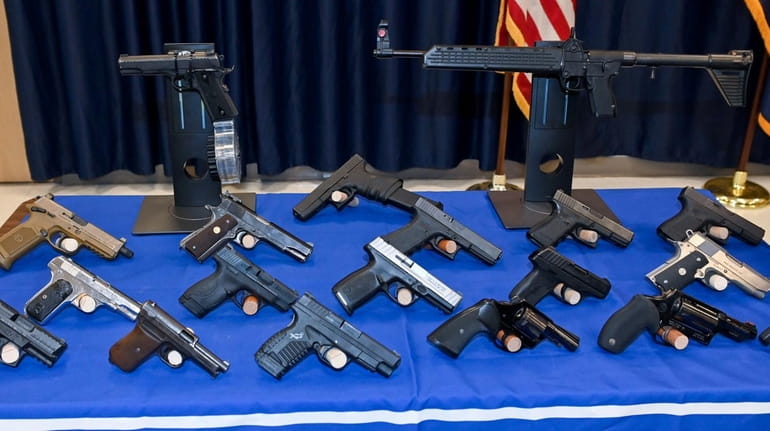Biden is closing a sacred portal into American gun culture

Illegal guns seized from a multistate trafficking ring on display at the Dennison Building in Hauppauge in February 2020. Credit: James Carbone
This column does not necessarily reflect the opinion of the editorial board or Bloomberg LP and its owners. Francis Wilkinson is a Bloomberg Opinion columnist covering US politics and policy. Previously, he was executive editor for the Week and a writer for Rolling Stone.
In issuing a new rule to close the gun show loophole for firearm sales, the Biden administration isn’t just narrowing one of the easier paths by which criminals obtain guns. It’s attempting to close a sacred portal into American gun culture.
The rule, which has been under public review since it was officially proposed last August, targets unlicensed gun dealers who sell their wares on the Internet, at flea markets or elsewhere without a federal license. It’s rooted in the Bipartisan Safer Communities Act, which President Joe Biden signed into law in 2022. Along with other regulations, the law clarified what “engaged in the business” of selling firearms means. The definition now includes unlicensed merchants who repeatedly sell guns for profit.
“If you sell guns predominantly to earn a profit, you must be licensed and you must conduct background checks,” Attorney General Merrick Garland said at a press briefing Wednesday. Other private firearms transfers, however, including among family members, will remain legal without a background check.
The need for such regulation has long been obvious. Between 2017 and 2021, federal investigations linked unlicensed dealers to 68,388 trafficked guns and 368 shootings. A 2009 report by gun violence researcher Garen Wintemute, based on research at 78 gun shows in 19 states, depicted a lawless free-for-all where guns traded hands amid Nazi memorabilia, Confederate flags and racist propaganda. When Bloomberg LP founder Michael Bloomberg was mayor of New York, he sent investigators to gun shows in other states, where they documented dealers willfully selling to straw purchasers and to a buyer who conveyed that he would fail a background check.
The teen perpetrators of the 1999 Columbine massacre obtained their guns from a friend who had purchased them, without a background check, at a gun show. They aren’t the only mass shooters who exploited the loophole. The Trace reported earlier this year:
In addition to the Columbine shooters, the private sales loophole armed a man who killed nine people at two Atlanta brokerage firms in 1999; a man who killed six of his co-workers and injured eight others at an aircraft parts plant in Meridian, Mississippi, in 2003; a man who killed seven people and wounded 25 others in Midland and Odessa, Texas, in 2019; and a teen who killed two people and wounded seven others at his former high school in St. Louis in 2022.
It has long been a tenet of the gun movement that guns are necessary for good guys to defend themselves against bad guys. This pronouncement has always been an awkward fit with the movement’s vigorous defense of the gun show loophole. Gun Owners of America vowed last year to go to court to block the unlicensed-seller rule if it goes into effect. Republican Senator John Cornyn of Texas, who helped negotiate the Bipartisan Safer Communities Act, called the rule a Biden “power grab” that has stretched the meaning of the phrase “engaged in the business” beyond the intent of Congress.
Screening firearm buyers for felony convictions or severe mental illness is consistently supported by an overwhelming majority of Americans, including gun owners. A typical background check takes only minutes to complete. (There’s a reason the federal checking system is called “instant.”)
By contrast, the demand to give dangerous people easy access to guns is politically unpopular, morally untenable, and logically bizarre. Yet it’s consistent with a movement that decries violence while insisting that cities, states, and the federal government must not regulate the lethality of firearms, who can access them or where and how they can be carried – regardless of the threat they pose to public health.
The National Rifle Association and other vectors of gun culture insist on the primacy of “law-abiding” gun owners. But if lawful gun owners are their focus, why have they waged a decades-long battle against restricting gun sales to criminals and the mentally ill? It’s not an easy question to answer.
It does, however, hint at the primeval force driving much of American gun culture. For millions of Americans, guns are a dangerous but acceptable tool for self-defense or sport – something to be handled only by those who meet a baseline level of lawful responsibility. For many others, they are more like a religious obsession – too sacred and transcendent to be encumbered by laws or shabby concerns with the pursuit of happiness or preservation of life. It’s primal. It’s incompatible with a modern society. And it looks like it will be killing us for many decades to come.
This column does not necessarily reflect the opinion of the editorial board or Bloomberg LP and its owners. Francis Wilkinson is a Bloomberg Opinion columnist covering US politics and policy. Previously, he was executive editor for the Week and a writer for Rolling Stone.
